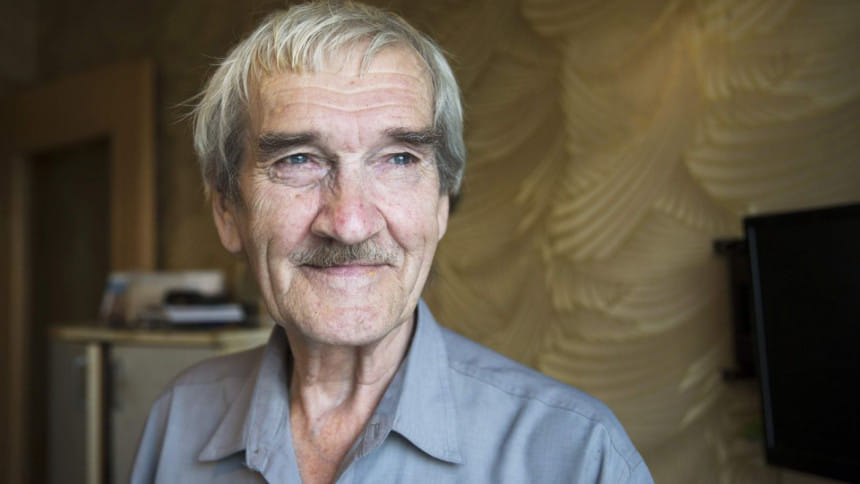The man who saved the world

On September 26, 1983, Stanislav Petrov, a Lieutenant Colonel in the Soviet Air Defence Forces was on duty in charge of an early warning radar system at the Serpukhov-15 bunker near Moscow. Just past midnight, he saw the radar screen showing a single incoming missile from the United States that was headed toward the then Soviet Union (USSR). "When I first saw the alert message, I got up from my chair. All my subordinates were confused, so I started shouting orders at them to avoid panic. I knew my decision would have a lot of consequences," Petrov recalled in an interview with RT in 2010.
The incident happened when relations between the US and USSR were at an all-time low. The NATO Double-Track Decision was taken in December 1979, deploying 108 Pershing II nuclear missiles in Western Europe with the capability of hitting targets in eastern Ukraine, Belarus or Lithuania in less than 10 minutes in response to the USSR's deployment of fourteen SS-20/RSD-10 theatre nuclear missiles.
According to later testimonies by CIA and KGB officers, because of the existing situation and following the Reaganite rhetoric, Soviet leaders at the time were convinced that the United States was preparing a secret nuclear first-strike attack on the USSR and initiated Operation RYaN, under which Soviet agents abroad would monitor US service and technical personnel who would implement a nuclear attack, so as to be able to either pre-empt it, or have mutually assured destruction.
Bruce Blair, an expert on Cold War nuclear strategies and former president of the World Security Institute in Washington, DC, said the American-Soviet relationship at that time "had deteriorated to the point where the Soviet Union as a system—not just the Kremlin, not just Soviet leader Yuri Andropov, not just the KGB, but as a system—was geared to expect an attack and to retaliate very quickly to it. It was on hair-trigger alert. It was very nervous and prone to mistakes and accidents. The false alarm that happened on Petrov's watch could not have come at a more dangerous, intense phase in US-Soviet relations." And later, that was the "closest" the two countries had ever come to an "accidental nuclear war".
Luckily, it was an accident that was averted singlehandedly by the quick-witted Petrov, who concluded that in case of a real first-strike attack, the US would go on an all-out offensive in order to disable any Soviet means of a counterattack and not just launch a single warhead. Petrov dismissed the warning as a false alarm, only to watch the siren go off moments later, for a second time. "Giant blood-red letters appeared on our main screen, saying START. It said that four more missiles had been launched," said Petrov.
From the moment they had supposedly taken off, there was only half an hour for the Kremlin to decide on whether to push the red button in retaliation and just 15 minutes for Petrov to determine whether the threat was real and to report it to his commanders for them to launch an all-out nuclear war (and possibly Armageddon). "I'll admit it, I was scared. I knew the level of responsibility at my fingertips," said Petrov.
With the fate of the world resting on his shoulders, Petrov had again kept his calm to come to the decision that the computer system must have malfunctioned once more, despite having no direct means of confirming this, as the USSR's land radar was incapable of detecting missiles beyond the horizon. On the flipside, waiting to positively identify the threat would limit the Soviet Union's response time only to a few minutes and so Petrov, according to his instructions, should have, at this point, reported that an American attack had been discovered.
Knowing, however, that a global war was likely to start (wiping out the US, USSR and most of mankind) if he reported a nuclear attack, Petrov decided, against orders, to wait. After a long wait, the missiles finally disappeared from the screens, and the world remained still intact.
The incident was kept secret as highly classified for more than 10 years. Even Petrov's wife, Raisa, who died in 1997, did not know anything of the role her husband had played in averting nuclear war. A year later, in 1998, it finally came to light when Petrov's superintendent, Colonel General Yury Votintsev, spoke out and a report about the officer's quiet deed appeared in a German tabloid.
Global recognition followed. And in 2006, the Association of World Citizens handed him an award which reads: "To the man who averted nuclear war," in the UN headquarters in New York. In 2012, Petrov was honoured with the German Media Prize which had also been awarded to Nelson Mandela. The year after, he received the Dresden Peace Prize, handed to him by a 25-year-old Dresden resident, who "belongs to the generation that would not have survived had it not been for Stanislav Petrov."
On September 7, 2017, when a German political activist named Karl Schumacher who had befriended Petrov, called him to wish him a happy birthday, he found out from Petrov's son that Petrov had passed away on May 19, in his home, in a small town near Moscow. The man who had saved the world was gone without the world even knowing about it.
When asked about how it felt to be recognised as a hero, Petrov said, "At first when people started telling me that these TV reports had started calling me a hero, I was surprised. I never thought of myself as one—after all, I was literally just doing my job." But the truth is, Petrov did not do his job as an officer of the Soviet Air Defence Forces on that fateful night. After all, he had refused outright to follow his instructions.
The job that he was speaking of was not assigned to him by his superiors, or anyone else for that matter; it was one that he had assigned to himself. That was, to protect that which was dearest to him—his world—which he did, but only by nearly jeopardising his own career and even his own life.
May "the man who saved the world" rest in peace. And may the world that he sought to preserve above all else recognise what it had meant to him, and honour his memory, by refraining from destroying itself—at a time when rhetoric from certain world leaders is threatening exactly that—now that its saviour is no more.
Eresh Omar Jamal is a member of the editorial team at The Daily Star.





Comments